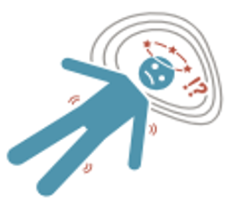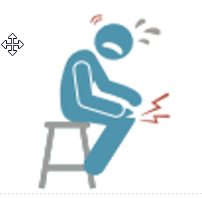First Aid Rapid Action Plan for FND Seizure management and POTS.
If on a University of Chichester campus immediately call for a First Aider on 01243 816363 quoting your location, name and the name of the casualty if known and nature of the injury/event. If off campus please ask for support from a first aider where available, and follow the information on the students support card re guidance for calling an ambulance.
The below information provides additional support for academics/students/members of the public and first aiders supporting a UoC student during a seizure event.
You will have most likely reached this link from QR code on the students individual Sunflower lanyard support card - please read this page in conjunction with the information on that card to fill any gaps in this documents generic information.
First Aid Rapid Action Plan
FND Seizures / POTS collapse
Functional Neurological seizure management. [Not Epileptic]
POTS collapse management [ Postural orthostatic tachycardia syndrome]
Suspected FND / POTS Under medical investigation.
Call a First Aider 01243 81 6363
Stay Calm and offer reassurance. Check for an individualised Lanyard.
Keep person safe. Aid recovery
Support to place of safety if possible.
Remove any objects that may cause harm.
Cushion head with a jumper or scarf.
Assess breathing and colour during an episode.
If possible gently place student into the recovery position, on their side.
For a collapse due to POTS/ faint consider raising the legs as this may support recovery. [ Check Lanyard]
When ready support the student to sitting in stages to limit risk of further collapse.
Consider need for a blanket or shade, shelter if they are outside.
Do not restrict or restrain as this may increase risk of injury.
Timing
• Note start time of seizure 1 / Episode and end time, this is the time that the student becomes aware.
• Note start and end time of subsequent seizures/ episodes
Stay with the student
• Stay with student until they are fully able to respond and communicate their wishes/ needs
• Maintain dignity by minimising onlookers and disruption.
• Keep environment as calm as possible as student may be able to hear.
• Reassure the student throughout episode and update them on what has happened once they have recovered.
• Post Episode support and encourage the student to sit down at the side of the session, until recovered.
Keep a Record
• Record pattern and duration of seizure activity.
• First Aider to Complete first aid report form. 1 report for seizure episode, single or cluster
• Academic staff to record how the student / students were supported to minimise disruption and anxiety.
Additional Information
This plan is for identified students and will be available on the First aid share point with the students consent.
It is designed to be used in conjunction with a personalised lanyard carried by the student, this should also be available on the SharePoint. It is also supported by a ‘Support to Study Health Plan’ which aligns with Fitness to Study stage 1.
Academic staff/ First Aiders are Welcome to contact student health studenthealth@chi.ac.uk following a First aid incident if they would like support, or would like to reflect on the management of incident
Guidance For Calling an Ambulance
It is ultimately at the discretion of the first aider or responsible person to decide whether an ambulance is required.
IF IN DOUBT CALL AN AMBULANCE
Call 999 if:
Breathing or circulation is compromised. Complexion/lips appear blue, or student is very pale.
An individual Episode or Seizure is prolonged more than 5 minutes. [ Check lanyard for individual timings]
The episode / seizure is unusual in presentation or severity. [ Refer to personalised lanyard if available]
There is a cluster of episodes / seizures with no sign of recovery.
The Student requests that an ambulance is called, or is distressed.
The student remains confused for more than 20 mins post seizure/ episode.
The student has sustained a potentially serious injury and requires medical assessment / treatment.
The incident cannot be managed by staff available. For instance no First aider is available
Call for Emergency help Dial 999
Seizure / episode is longer than 5 minsCheck lanyard if available. | Unusual Seizure/ Episode or Cluster | Head Injury / Serious InjuryBreathing concerns / blue lips. |
Instructions for calling an Ambulance
Call 999 for the ambulance service and ask for a paramedic ambulance immediately. Note time.
Inform them that the student is having a seizure or has collapsed.
It is important to state “a paramedic” is needed, as they carry medication.
Give the student’s location, room no in halls and the University address.
Ensure 01243 816363 has been informed that an ambulance has been called and the location of the student, so that the ambulance can get to the student as soon as possible.
Ask for a first aider to be sent to your location if not already present.
If possible send someone to SIZ to meet Ambulance and guide to location.
Stay with the student at all times and ensure the student is kept as warm and comfortable as possible. Offer reassurance.





